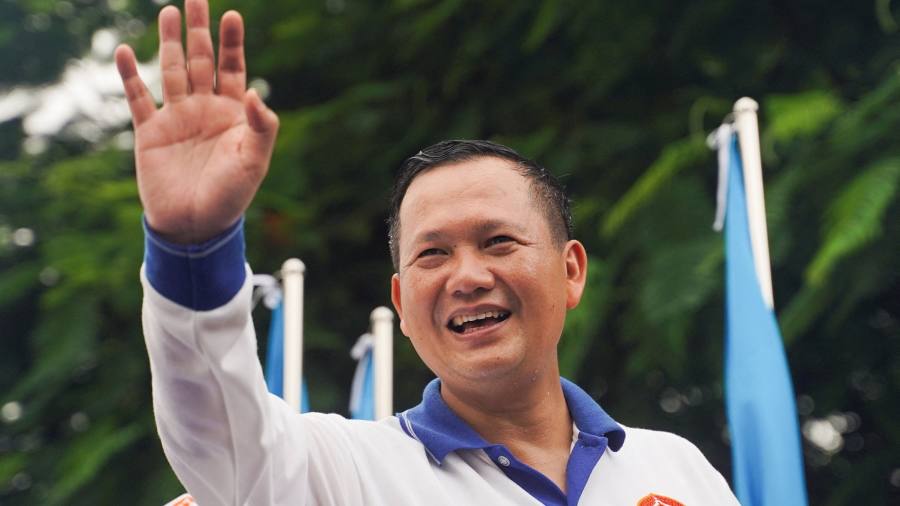Receive free Cambodia updates
We’ll send you a myFT Daily Digest email rounding up the latest Cambodia news every morning.
In 1997, the year he turned 45, Cambodian prime minister Hun Sen ordered a ruthless and brutal military strike against his coalition government partners.
It marked the end of a four-year power-sharing agreement that was instituted after Hun Sen’s Cambodian People’s party lost the UN-organised 1993 election, but refused to give up control to the victorious Funcinpec party. Dozens of soldiers and officials in the royalist group were murdered in the following weeks, and Hun Sen emerged the sole prime minister.
Next month, at the age of 45, Hun Manet will take over that role from his father — the first transition of power in 38 years. The handover announcement on July 26 came days after the CPP swept a national election widely seen as a sham after their only credible rivals were disqualified.
Long groomed for leadership, Hun Manet’s upbringing and path to power contrasts starkly with that of his 70-year-old father, who has ruled Cambodia with an iron first for nearly four decades.
Born in rural Kampong Cham province, Hun Sen joined the Khmer Rouge at 18, rose to become a mid-ranking commander and lost an eye from shrapnel only weeks before the communist forces took control of Phnom Penh in 1975.
During the totalitarian reign of Pol Pot, in which at least 1.7mn Cambodians died of starvation and disease or were executed, Hun Sen fled to Vietnam to avoid internal purges. Vietnam invaded and ousted the Khmer Rouge in 1979 and, at 26, Hun Sen was installed as foreign minister before being made prime minister in 1985.
The young leader’s savvy drew the attention of the press as the UN worked to broker a deal in what had become a cold-war proxy conflict. In a 1989 story covering the negotiations, The New York Times newspaper remarked that the gangly ex-guerrilla had grown from a “tongue-tied” 27-year-old to an “articulate and unintimidated” prime minister of 38, who “represents modernity” to young Cambodians.
Hun Manet was 12 at the time. He attended high school in Phnom Penh and in 1995 joined the Cambodian military and was subsequently sent to US Military Academy West Point, from where he became the first Cambodian to graduate in 1999.

Expectations were high from an early age for Hun Manet, who is married to the daughter of a prominent politician and has three children. While he was still at West point in 1996, Hun Manet spoke to the Phnom Penh Post. The newspaper reported Hun Sen had told his firstborn son: “You will continue when I am gone.” Hun Manet said he wanted to help “strengthen the army” and “rehabilitate the country”.
Hun Manet pursued further studies abroad — earning an economics degree from New York University in 2002 and a doctorate in economics from the UK’s University of Bristol in 2008 — while steadily rising through the ranks of the military.
He has held senior roles in his father’s bodyguard unit, the counter-terrorism force and the army, which he most recently commanded, and was made a four-star general this year.
Hun Manet ostensibly played a role in commanding forces during sporadic skirmishes between Cambodian and Thai soldiers between 2008 and 2011. A diplomatic source with deep knowledge of the Cambodian military, however, said Hun Manet had no real operational control during the fighting, which was run by war-experienced commanders.
The person said Hun Manet appeared to be genuinely popular among many rank-and-file soldiers but his professional military experience was negligible, and his efforts to reform massive rank inflation fizzled in the face of the powerful vested interests of the old guard.
“His roles in the military are political,” the source said. “He concurrently held a number of roles, each of which would realistically be a full-time job.”
In recent years, his role has turned more overtly political. In 2015, he joined the CPP standing committee and started leading efforts to increase party support abroad. In 2020, he became head of the party’s youth wing and started giving regular public speeches.
Endorsed as a future prime ministerial candidate in 2021, Hun Manet has said little about his own vision or plans for the country. Instead, he appears to emulate his father’s speaking style and mannerisms, exhorting the CPP’s claimed legacy of “peace, stability and development” while attacking his father’s political rivals with the same aggression the elder has employed for decades.
This public persona is at odds with his past “calm” and “humble” private manner, said Australian Cambodian Kalyan Ky, who worked with Hun Manet between 2014 and 2017 in Australia.
“It’s like acting, it’s putting on an act,” said Ky. “It’s strange to see the contrast with the very different person he was before.”
Ky said Hun Manet would talk about his aspirations to improve the country by tackling corruption and improving trade and tourism. She said he did not seem burdened by his position as Hun Sen’s heir, but was surrounded by many “power hungry” individuals.

“I’m hopeful that he still has his visions and aspirations that he wants to make the country better,” she said. “Hopeful, but also fearful, because there won’t be many democratic changes that will happen.”
With Hun Sen in the background, there is little chance Hun Manet’s position will be challenged within the family-connected elite patronage system that underpins the CPP’s power. But that could change in the future, said a government source.
“Hun Sen is very unique in terms of his personality and his abilities,” said the source, who requested anonymity to not jeopardise their job. “As long as he is in the background, his influence will hold the party together.”
“I don’t think [Hun Manet] is like his dad,” he added. “He’s much more softly spoken.”
A version of this article was first published by Nikkei Asia on July 27, 2023. ©2023 Nikkei Inc. All rights reserved.
Related stories
Read the full article here




